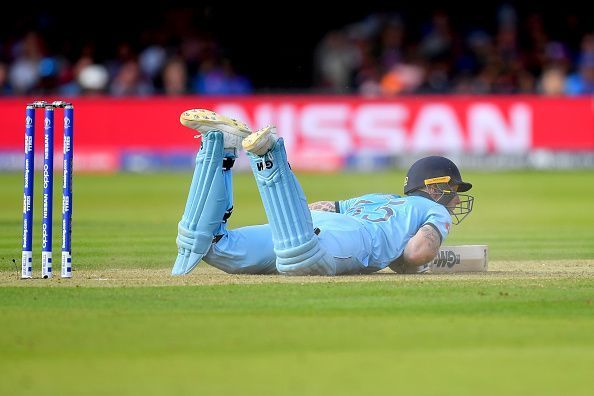
World Cup 2019: Ben Stokes deflection for four 'was an error of judgement', says Simon Taufel on overthrow controversy

The 2019 World Cup came into an end in a nerve-racking manner as England won the final and the World Cup after beating New Zealand on the basis of 'boundary count' after the game ended in a tie and the subsequent super-over also ended as a tie.
As exciting that the match may have been, quite a few controversies broke out immediately. One of the most-talked-about issues was the overthrow that helped England tie the regular match in the first place. Even though England would have fancied getting 9 off 3 balls to win the World Cup, New Zealand would have been fairly confident on their own too. This is when the match turned upside-down. Ben Stokes hit the 4th ball, a full toss from Trent Boult to the mid-wicket fielder and immediately took off for a brace. The fielder who was stationed there threw the ball hard to the striker's end given that Stokes was struggling to reach the crease.
The English all-rounder dived full stretch but the ball hit his bat and subsequently went on to reach the boundary. The umpires awarded four runs to England but that wasn't the problem. The issue was that the two batsmen hadn't crossed at the instant the ball was thrown and hence only one run should have been awarded in addition to the four runs that had to be given because the ball reached the fence. Speaking to The Age and Sydney Morning Herald, Simon Taufel said:
"There was a judgment error on the overthrow. The judgment error was the timing of when the fielder threw the ball. The act of the overthrow starts when the fielder releases the ball. That's the act.It becomes an overthrow from the instant of the throw."
However, Taufel also went on to defend the umpires saying that they have to monitor a lot of things under pressure and such errors do happen now and then.
"So it's unfortunate that there was a judgment error on the timing of the release of the ball and where the batsmen were. They did not cross on their second run, at the instant of the throw. So given that scenario, five runs should have been the correct allocation of runs, and Ben Stokes should have been at the non-striker's end for the next delivery.
"We're not perfect. You've got the best two umpires in the elite panel doing the final. They're doing their best like the other two teams are. This is just part of the game.
"I think it's unfair to say that the World Cup was decided by that one event. There's a lot of 'what ifs' and 'what should bes' and 'what could bes' that happen off those 600-plus deliveries. That's the nature of sport.” Taufel added.
MCC's laws regarding overthrows back up Taufel's statement.
According to Law 19.8, pertaining to an "overthrow or wilful act of fielder", Stokes should only have been credited for five runs.
"If the boundary results from an overthrow or from the wilful act of a fielder, the runs scored shall be any runs for penalties awarded to either side, and the allowance for the boundary, and the runs completed by the batsmen, together with the run in progress if they had already crossed at the instant of the throw or act," the law says.
This error may have had a massive impact on the game considering that England would have required 4 runs off the last 2 balls and more importantly, Ben Stokes would have been off strike. New Zealand and Trent Boult would have taken the opportunity to bowl to Adil Rashid too in spite of the leg-spinner's handy ability to score useful runs.
In the end, it was a shame for an outstanding game to have ended in such a manner just like how Kane Williamson termed the incident during the post-match talk with Nasser Hussain. England should be still considered worthy winners but Williamson and New Zealand might rue 'what if' the rules had been correctly interpreted.
Also read – World cup winners list
Follow Sportskeeda for all the updates on World Cup schedule, points table, news, World Cup most runs, live scores, most runs, most wickets and fantasy tips.